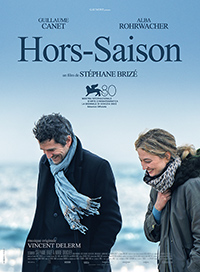Lover Come Back: Romance Rekindles in Brizé’s Elegant Exploration of Regret
 The universal dilemma of romantic regret is wondering ‘what could have been’ based on the rosy-tinted glasses of retrospect, which is what makes nostalgia such a dangerous emotional elixir. Those who have the novel chance of exploring those missed opportunities are also forced to confront the melancholic disparity which has catalyzed their trip down memory lane in the first place, sometimes to inherently destabilizing effect. But Stéphane Brizé’s latest film, the masterful Hors-saison (Out of Season), is itself an homage to classic, bittersweet melodrama as its two lovers reunite incidentally in a sleepy, seaside town, who are both also, metaphorically feeling a bit like the empty, despondent interval between tourist travel of the title. Guillaume Canet and Alba Rohrwacher steer this familiar scenario quite gracefully as a charming and wistful couple who are not destined to be together.
The universal dilemma of romantic regret is wondering ‘what could have been’ based on the rosy-tinted glasses of retrospect, which is what makes nostalgia such a dangerous emotional elixir. Those who have the novel chance of exploring those missed opportunities are also forced to confront the melancholic disparity which has catalyzed their trip down memory lane in the first place, sometimes to inherently destabilizing effect. But Stéphane Brizé’s latest film, the masterful Hors-saison (Out of Season), is itself an homage to classic, bittersweet melodrama as its two lovers reunite incidentally in a sleepy, seaside town, who are both also, metaphorically feeling a bit like the empty, despondent interval between tourist travel of the title. Guillaume Canet and Alba Rohrwacher steer this familiar scenario quite gracefully as a charming and wistful couple who are not destined to be together.
Mathieu (Canet) has left a theatrical production four weeks before its premiere, absconding to a remote coastal town to recover his frazzled emotional state at a luxury spa for a week. A major A-list celebrity, he’s recognized everywhere he goes, with the hotel staff ecstatic about his presence. Back home, angry producers and his incredibly busy girlfriend, a high profile news anchor, offer him no respite. Suddenly, he receives a private message at the hotel from Alice (Alba Rohrwacher), a woman he had dated fifteen years prior, leaving her to pursue his career. She’s now a wife and mother who just so happens to live in the quant town he’s visiting. A reunion at lunch finds they both harbor feelings for one another, their unresolved state quickly becoming intimate.
Every generation seems to inherit their own specific cinematic entanglement with the scenario Brize formulates in Hors-Saison. It’s impossible not to recall David Lean’s 1945 benchmark Brief Encounter, which creates a similar sense of the same cultural imperatives holding these two people apart despite a considerable interest in exploring their options. Time is their wicked thief, granting them an opportunity while slowly draining it away, which allows for fluctuations into resentment and bitterness. Mathieu will leave once again, and be allowed to explore creative opportunities despite his current embarrassment. But Alice will remain trapped in amber, living in a town and with a family where she cannot explore her true passions as a composer/pianist. As Alice, Rohrwacher once again displays her considerable emotional range, straddling the confusing divide of happy/sad, the emotions she’s squirreled away bubbling up, ovewhelming them both.
Besides Lean, another French classic comes to mind, Claude Lelouche’s Palme d’Or winning A Man and a Woman (1966), which inspired him to make two sequels several decades apart. Those lovers find themselves still consumed by their past relationships as well, tentative about jumping into another intense, era defining relationship in their lives. Within Brizé’s own filmography, his latest shares a kindred spirit with 2009’s Mademoiselle Chambon, where Vincent Lindon and Sandrine Kiberlain (who were also once married) silently desiring one another, but in roles where crossing boundaries might have ripple effects beyond themselves.
Composer Vincent Delerm gives Alice and Mathieu their own musical theme, which arrives at the most melancholic moments of longing, while Antoine Heberle’s cinematography plays with widening the scope as we toggle around in the grayness of the season. Canet’s charm develops a tenderness as the narrative progresses, who opens the film as an out of sorts actor at a crossroads in his superficial relationship back home and a creatively stagnant career, and Brizé’s initial beats suggest a broad, slapstick sort of comedy. Rohrwacher’s bewitching gracefulness brings this (and his fluttery anxiety) to a standstill.
Beyond its two pristine lead performances, Brizé and Marie Drucker’s screenplay (who appeared in his 2021 title, Another World) adds some beautiful, and even strange peripheral moments. Two of these highlights include an elderly woman whom Alice has befriended, a widow who is finally allowed to explore her sexuality in her golden years. We meet her in a recorded interview from Alice, which is touching in its gentle, compasstionate exploration of the woman’s experiences. At this woman’s wedding to the love of her life, attended by Alice and Mathieu, a pair of performers imitating various species of birds chattering away at the guests, who are as curiously rapt about what they’re doing as we are.
Much like this year’s earlier release of Celine Song’s Past Lives, Brizé explores the infinite complexities of human behavior and their corresponding relationships via a simple format which yields formidably poignant results.
Reviewed on September 8th at the 2023 Venice Film Festival – In Competition. 115 Mins.
★★★★/☆☆☆☆☆


